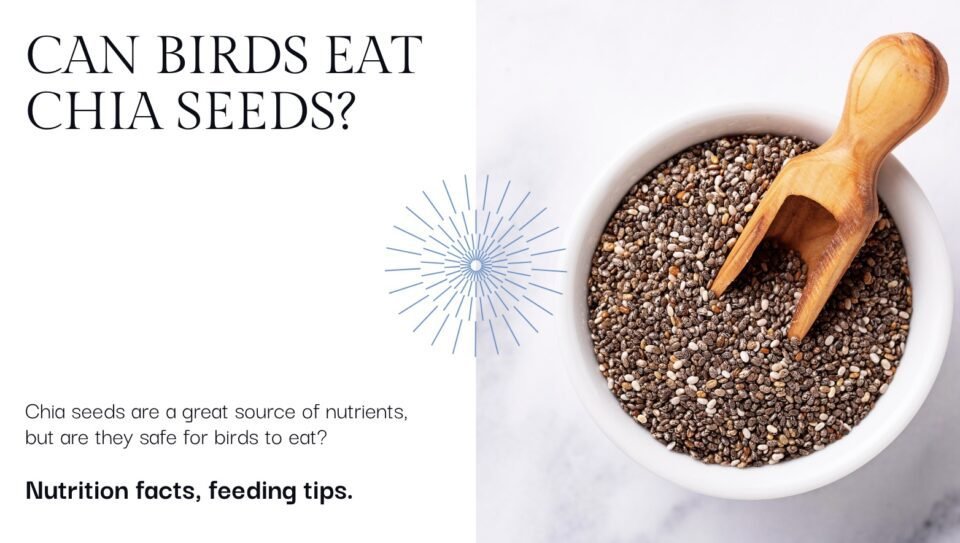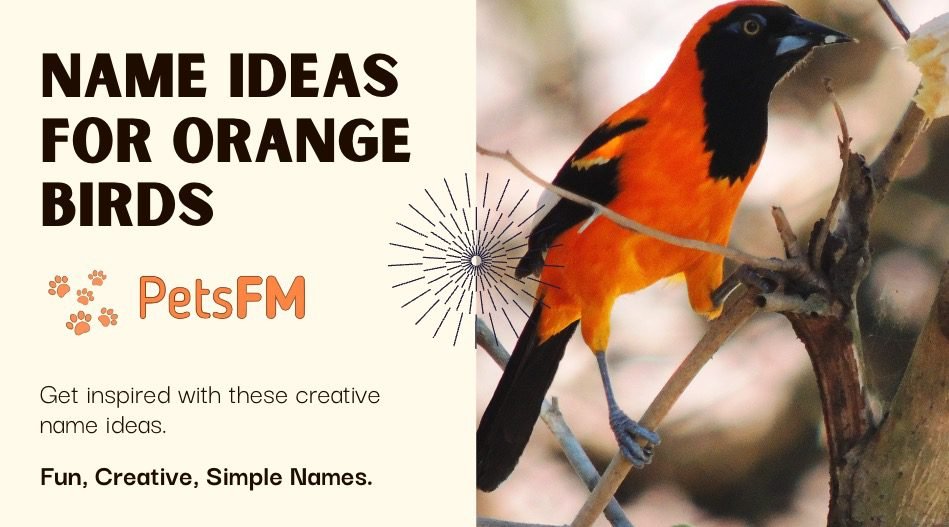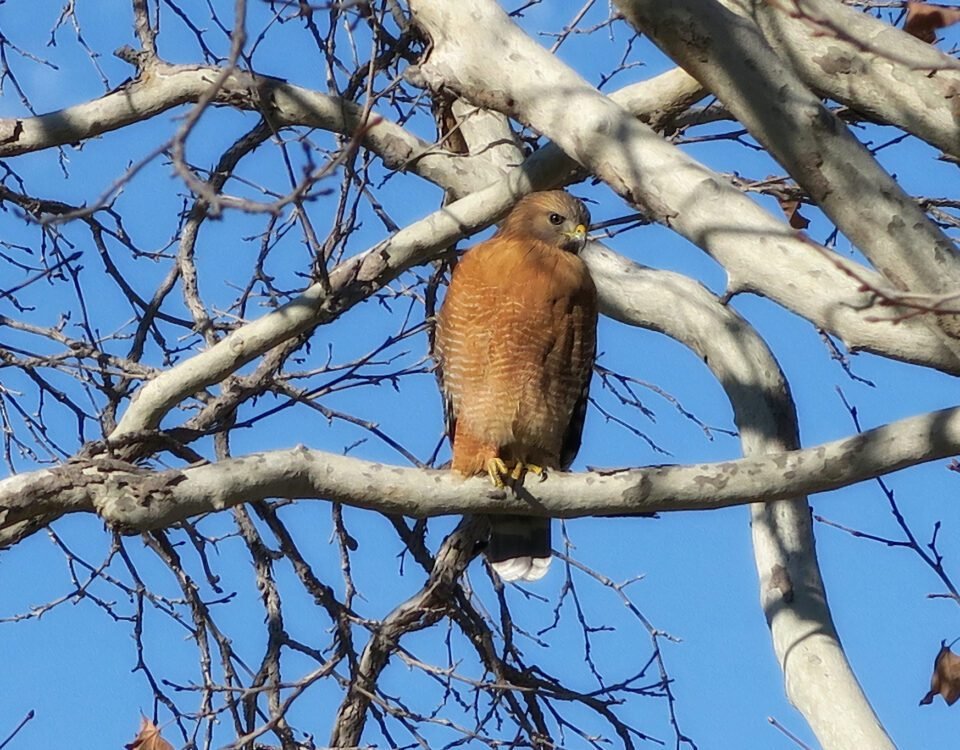


Why does cat litter keeps getting stuck to my cat’s bum? [Solutions]
December 30, 2023


Why Are Chihuahuas So Angry? 7 Management Techniques
December 30, 2023The chia seed, a tiny yet highly nutritious seed, comes from the Salvia hispanica, a plant belonging to the mint family. It’s celebrated for its numerous health advantages in human diets. However, humans aren’t the only ones who might enjoy these benefits. The question arises: are chia seeds also safe for bird consumption?
Chia seeds are safe for birds to eat. Rich in omega-3 fatty acids, fiber, and protein, these seeds offer significant nutritional benefits to birds, aiding their general health and feather quality. Introducing new foods gradually and watching for any signs of allergic reactions is essential.
In this article, we’ll explore the specifics of feeding chia seeds to your feathered friends in the backyard. Stay tuned to learn more about these nutritious seeds’ impressive health benefits to birds.
Related Read: Are Birds Herbivores? A Look at Different Bird Species
Nutritional Value Of Chia Seeds
Chia seeds are tiny nutritional powerhouses derived from the Salvia hispanica plant. They are packed with essential nutrients and are mainly known for their high content of omega-3 fatty acids, protein, and fiber, making them a popular choice for health-conscious individuals.
Additionally, chia seeds boast a rich array of vitamins and minerals, including:
- Manganese: Crucial for growth and development.
- Phosphorus: Contributes to tissue maintenance and supports bone health.
- Copper: Important for heart health.
- Antioxidants: Such as selenium, chlorogenic acid, caffeic acid, kaempferol, and myricetin. These antioxidants aid birds in maintaining a healthy liver and heart.
- Iron: Facilitates the transport of oxygen throughout the body.
- Magnesium: Plays a role in various bodily processes.
- Calcium: Essential for strong bones and muscles.
- Amino Acids: Including lysine, arginine, methionine, isoleucine, phenylalanine, leucine, and tryptophan.
- Vitamin B9 (Folate): Important for cell division and robust growth.
- Vitamin B2 (Riboflavin): Vital for increased energy and protein metabolism.
- Vitamin B1 (Thiamin): Essential for properly functioning the nervous system.
- Vitamin B3 (Niacin): Supports strong growth in young birds.
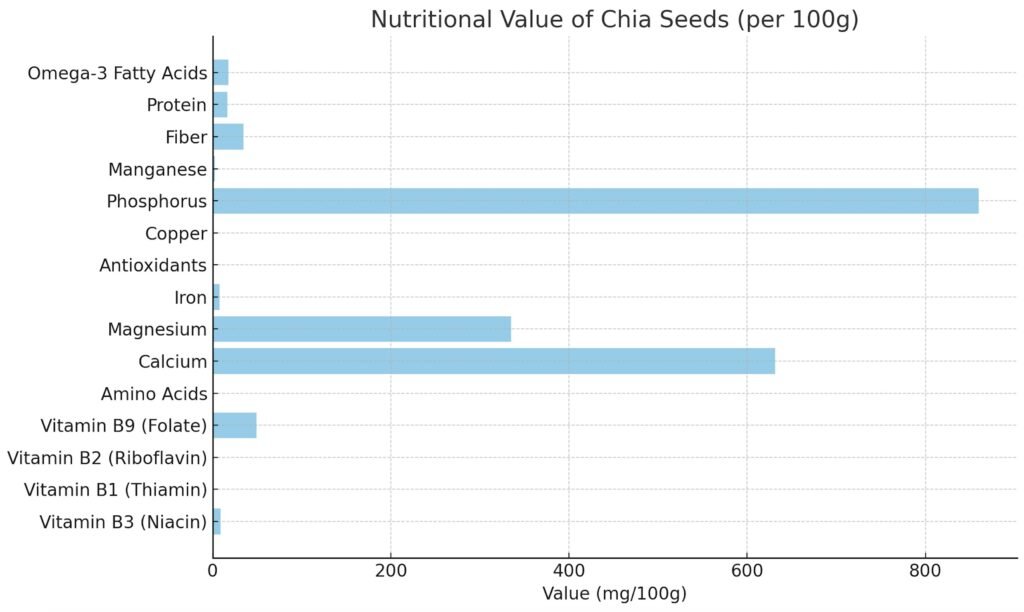

Nutritional Value Of Chia Seeds – Graph
Where Do You Get Chia Seeds From?
The origin of chia seeds traces back to the Salvia hispanica plant, a desert plant commonly found in Central America. Notably, chia seeds have a historical significance as they were a staple in the diets of Aztecs, Mayans, and Native Americans.
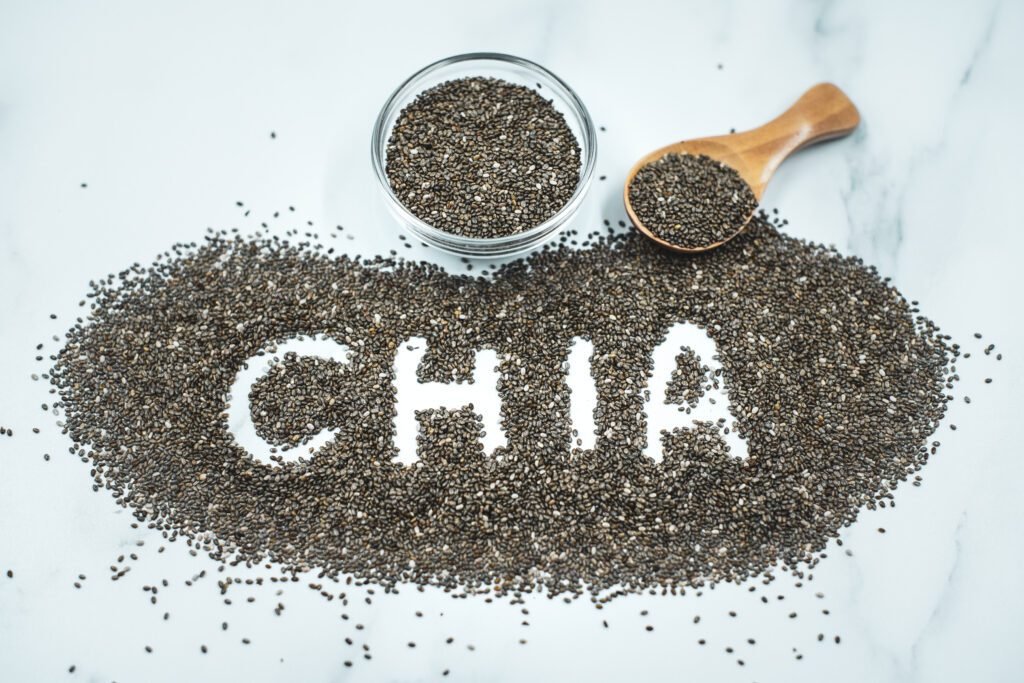

Chia Seeds
Furthermore, it’s fascinating to observe that wild birds traversing desert regions often rely on chia seeds as a food source during their migration. Additionally, local bird populations in these areas frequently incorporate chia seeds into their diets.
In the following sections, we’ll look at the individual nutrients in chia seeds and uncover the reasons behind their benefits for birds.
Benefits of Chia Seed Nutrients for Birds
Protein: Protein is crucial as bird feathers primarily comprise this vital nutrient. Remarkably, a bird’s feathers consist of approximately 90% protein. This explains why mother birds often provide their chicks with protein-rich foods.
Calcium: Calcium holds particular importance, especially for young birds and females preparing to lay eggs. It’s a mineral not readily available in other foods that birds consume.
Fatty Acids: Omega-3 and Omega-6 fatty acids are essential components. They play a critical role in supporting a bird’s immune system, enabling it to fend off diseases effectively.
Fat: Birds require an additional supply of fat, especially during colder weather, as it aids in regulating their body temperature and keeping them warm in freezing conditions. Fats are also integral to feather formation, preventing deformities and discoloration.
Phosphorus: This mineral is indispensable for maintaining a bird’s strength and coordination.
Manganese: Another essential mineral, manganese, contributes to robust and healthy egg production while supporting a strong metabolism.
Fiber: Fiber assists birds in moving food through their digestive tract, preventing constipation and ensuring smooth digestion.
Which Bird Species Like To Eat Chia Seeds?
Adding chia seeds to your backyard feeders can attract various seed-eating birds, and some wild bird species are naturally inclined to include chia seeds in their diets. Here are the bird species that commonly incorporate chia seeds into their diets:
- Hummingbirds: While sweet nectar is a significant part of their diet, hummingbirds often consume chia and other tiny seeds to complement their energy needs.
- Roadrunners: These comical birds, often found in desert regions, particularly in Mexico, regularly include chia seeds in their diet, along with insects, rodents, fruits, and prickly pear cacti.
- Woodpeckers: Woodpeckers inhabiting desert regions are known to consume chia seeds as part of their diet, in addition to insects, nuts, berries, and other types of seeds.
- Finches and Buntings: Small birds like finches and buntings have seed-eating diets that include chia seeds. They also have a preference for mealworms and various insects.
- Quails: Ground-feeding quails have a diverse diet containing many types of seeds, and chia seeds are often part of their wild diet.
- Sparrows: Commonly found in urban areas and around backyard feeders, sparrows enjoy a variety of seeds, including chia, sunflower, and safflower seeds. They also favor fat balls in the winter, while insects are their preferred food in spring and summer.
- Pigeons and Doves: Some pigeons and doves live in desert regions and are ground foragers. They consume various grains and seeds, including chia seeds, when available.
- Macaws: Large birds native to Mexico, Central, and South America, macaws have a diverse diet consisting mainly of fruits, seeds, nuts, snails, and insects. Chia seeds are part of their dietary choices.
- Blackbirds: While primarily foraging insects, blackbirds supplement their diet with fruits, berries, and various seeds, including chia seeds.
- Goldfinches: Goldfinches are known for their exclusive consumption of grains and seeds. Chia seeds are a favored food source for them, and they also enjoy other seeds like sunflower seeds, nyjer, and thistle.
- Blue Jays: These vibrant and lively birds primarily follow a vegetarian diet. Their food choices include nuts, acorns, berries, small fruits, beechnuts, and chia seeds.
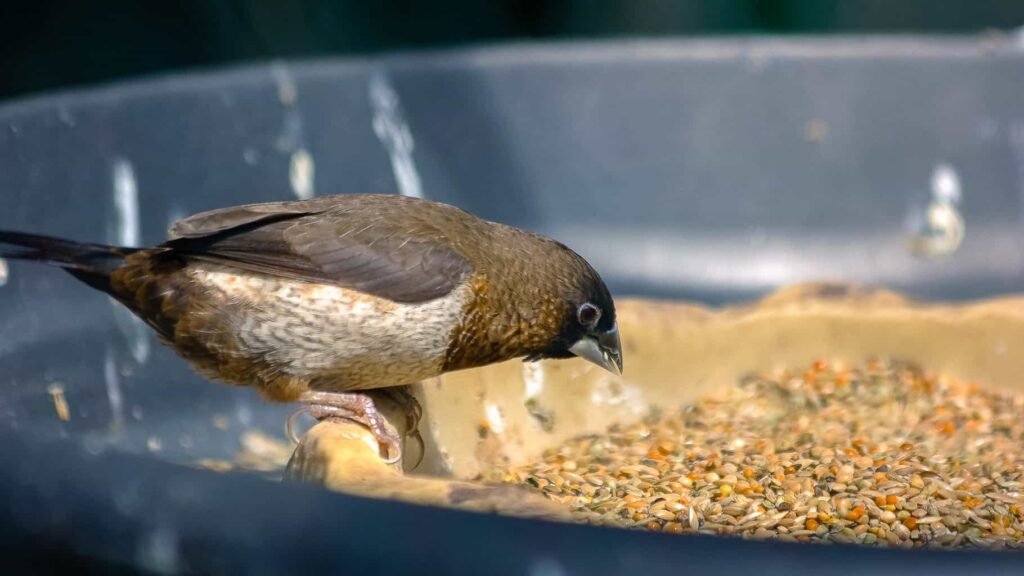

Bird Eating Chia Seeds
Introducing Chia Seeds into a Bird’s Diet
Here’s how you can safely introduce chia seeds into your bird’s diet:
Feeding Raw Chia Seeds: Chia seeds can be safely incorporated into a bird’s diet in their raw form. You can scatter these seeds among other types of seeds at a feeding station or hang them in bird feeders, allowing your backyard visitors to enjoy a nutritious meal.
Variety for a Balanced Diet: To ensure that birds receive a well-rounded and nutritious diet, consider offering chia seeds and other seed varieties, berries, and dried mealworms.
Soaked Chia Seeds: While not necessary, soaking chia seeds is an option that can enhance the availability of nutrients. To serve chia seeds this way, simply add water and wait until they develop a pudding-like texture. Then, place them on a tray for visiting birds to savor.
Choose Organic Chia Seeds: If you choose to supply your feeders with chia seeds, it’s advisable to opt for organic varieties. Organic chia seeds are free from pesticide residues, and other added chemicals that could be harmful to birds.
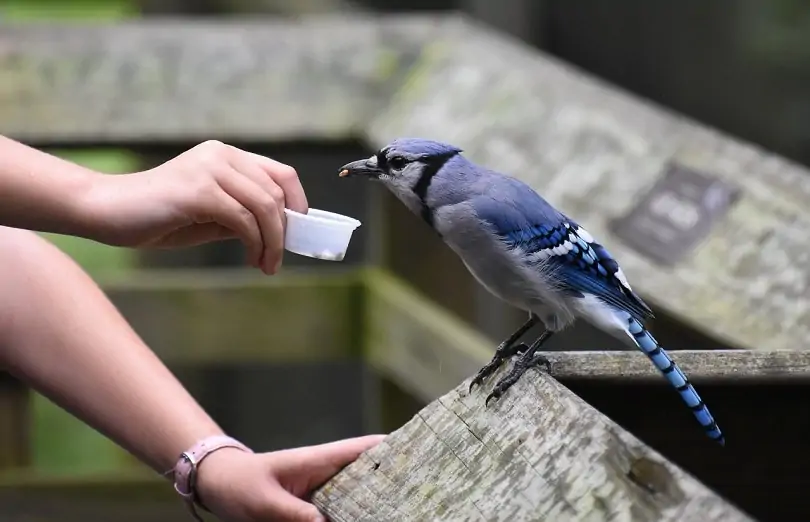

Best Time for Feeding Chia Seeds to Wild Birds
The ideal time to offer chia seeds to wild birds is, essentially, anytime throughout the year. Chia seeds are an excellent year-round food source due to their nutritional value, providing protein, antioxidants, fiber, and essential vitamins and minerals.
Chia Seeds in Winter
Birds readily consume chia seeds in winter. These seeds are particularly beneficial during cold weather, as they are rich in healthy fats that help birds maintain body warmth in freezing temperatures.
Chia seeds also contain immune-boosting Omega-3 and Omega-6 fatty acids, supporting birds in staying fit and resilient during the winter.
Chia Seeds in Summer
Chia seeds remain a dietary choice for birds during the summer as well. This season, marked by nesting and raising young, demands a well-balanced and nutritious bird diet.
Chia seeds provide critical minerals like calcium and manganese, which are especially important for female birds during this period. These minerals aid in producing healthy eggs and ensuring the development of strong bones in young birds.
Additionally, the protein and fatty acids of chia seeds are essential for birds to sustain their strength and endurance while foraging, mating, and caring for their offspring.
Planting Chia Seeds for Birds
Chia seeds can be cultivated in the southwestern United States within the native or naturalized range for Salvia plants. Advances in plant breeding have also resulted in cultivars that can thrive as far north as Arizona and east as Kentucky.
These cultivars flower early and are not hindered by the first frosts, making them suitable for a broader range of regions.
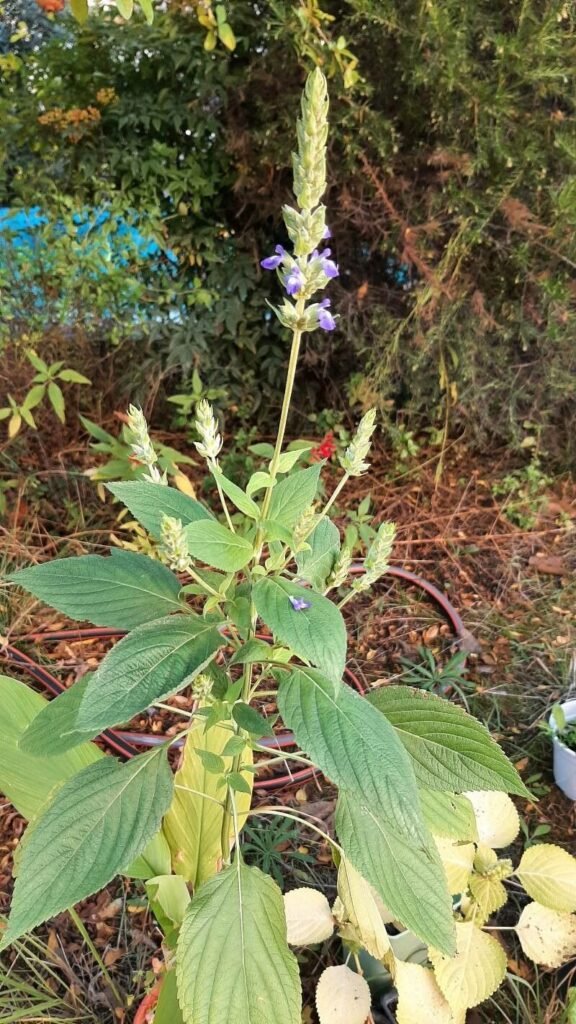

Planting Chia Seeds
However, it’s important to note that you need to reside in warmer, longer-summer climates to grow chia seeds in quantities sufficient for both your consumption and feeding the birds. Nonetheless, if you live in a suitable area, experimenting with cultivating this ancient crop can be a rewarding effort.
One compelling reason to consider growing your chia seeds, where feasible, is the reduction of food miles. This practice can lower your carbon footprint and align with an earth-centric and wildlife-friendly lifestyle, benefitting the environment and local wildlife.
How Many Chia Seeds Are Considered Safe For Bird Consumption?
The quantity of chia seeds a bird can or should consume is not precisely defined. Birds typically do not overeat chia seeds if you provide them in a mixture with various other seed types. This ensures that the birds have a balanced diet without concerns about overconsumption.
Related Read: Can Birds Eat Tomatoes? [Safe Vs. Unsafe Types]
Do You Need To Soak The Chia Seeds Before Offering Them To The Birds?
Chia seeds need not be soaked before being offered to birds. Dry chia seeds are a suitable food source for many wild birds in your vicinity.
However, soaking chia seeds can enhance their nutritional availability, making this food source more accessible to a broader range of wild birds that visit your garden.
Related Read: Can Birds Eat Cat Food? A Comprehensive Guide
Can Birds Eat Chia Seed Pudding?
When chia seeds are soaked in water for a short period, they develop a pudding-like texture resembling thick porridge with a gelatinous consistency. Some people create chia seed pudding recipes by adding dairy or other ingredients.
It’s important to note that you should not feed wild birds dairy milk, as they cannot digest dairy products. If you have leftover chia seed pudding made with dairy milk, avoiding offering it to the birds is best. However, if the pudding contains almond milk or another vegan milk substitute, it should be safe for birds.
It’s advisable to provide sugary foods to most garden birds only as an occasional treat and in moderation. Additionally, salty foods should always be avoided when feeding wild birds.
Wrapping Up
Chia seeds are a valuable source of diverse nutrients, vitamins, and minerals for seed-eating birds. Their high fiber content helps in digestion and helps prevent constipation in birds. Furthermore, chia seeds can be offered to birds in their raw form without processing.
Adding chia seeds to your backyard feeders is a wonderful idea, as they are eagerly consumed by the birds that frequent your outdoor space. To ensure a well-rounded diet for your backyard birds, it’s essential to provide a variety of seeds, along with nuts, berries, and small fruits.
This diverse menu ensures the birds receive all the necessary nutrition, encouraging them to return for more. With a bit of luck, you may even attract regular visitors, their mates, and young ones, making your backyard a bustling hub of avian activity.
